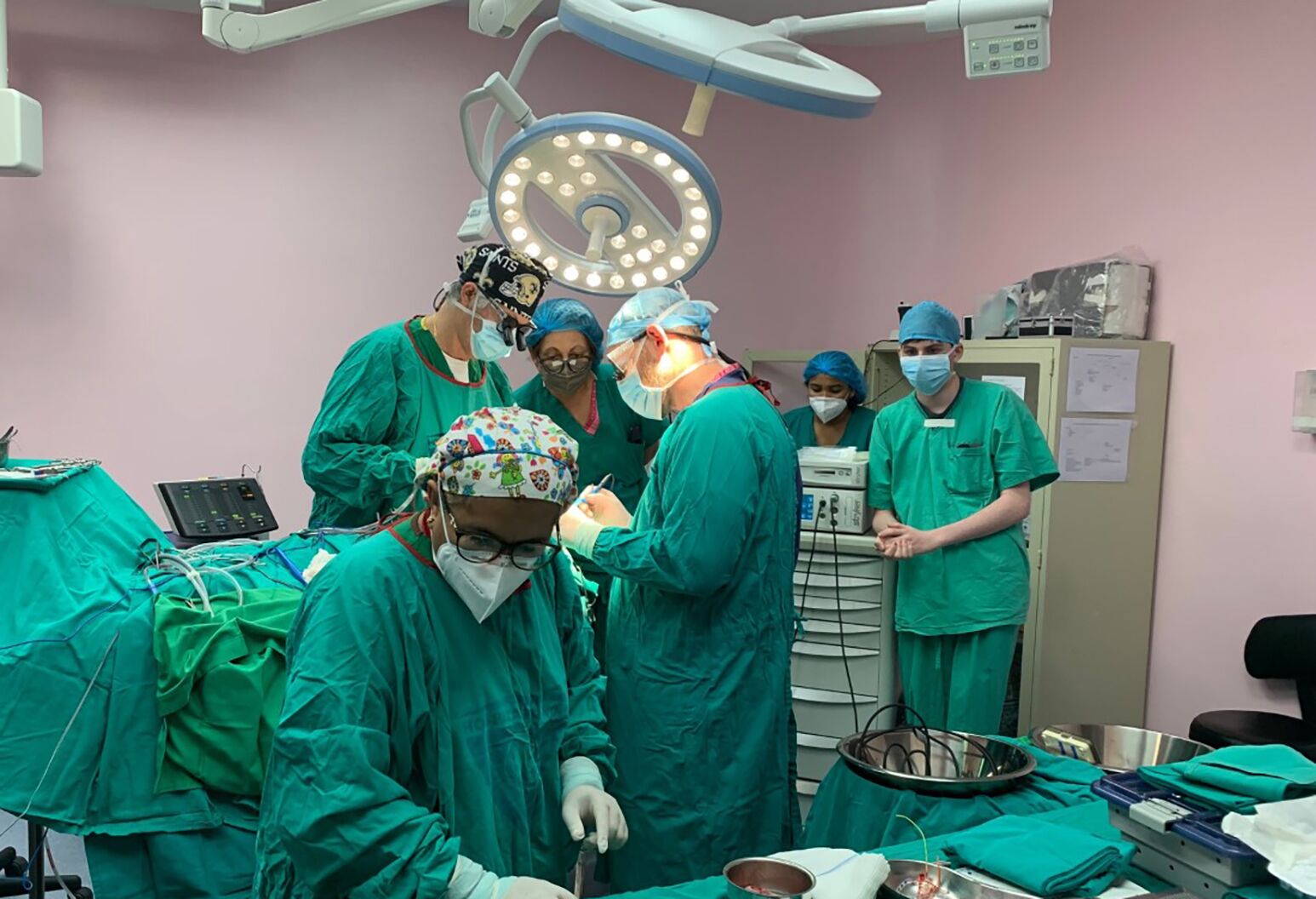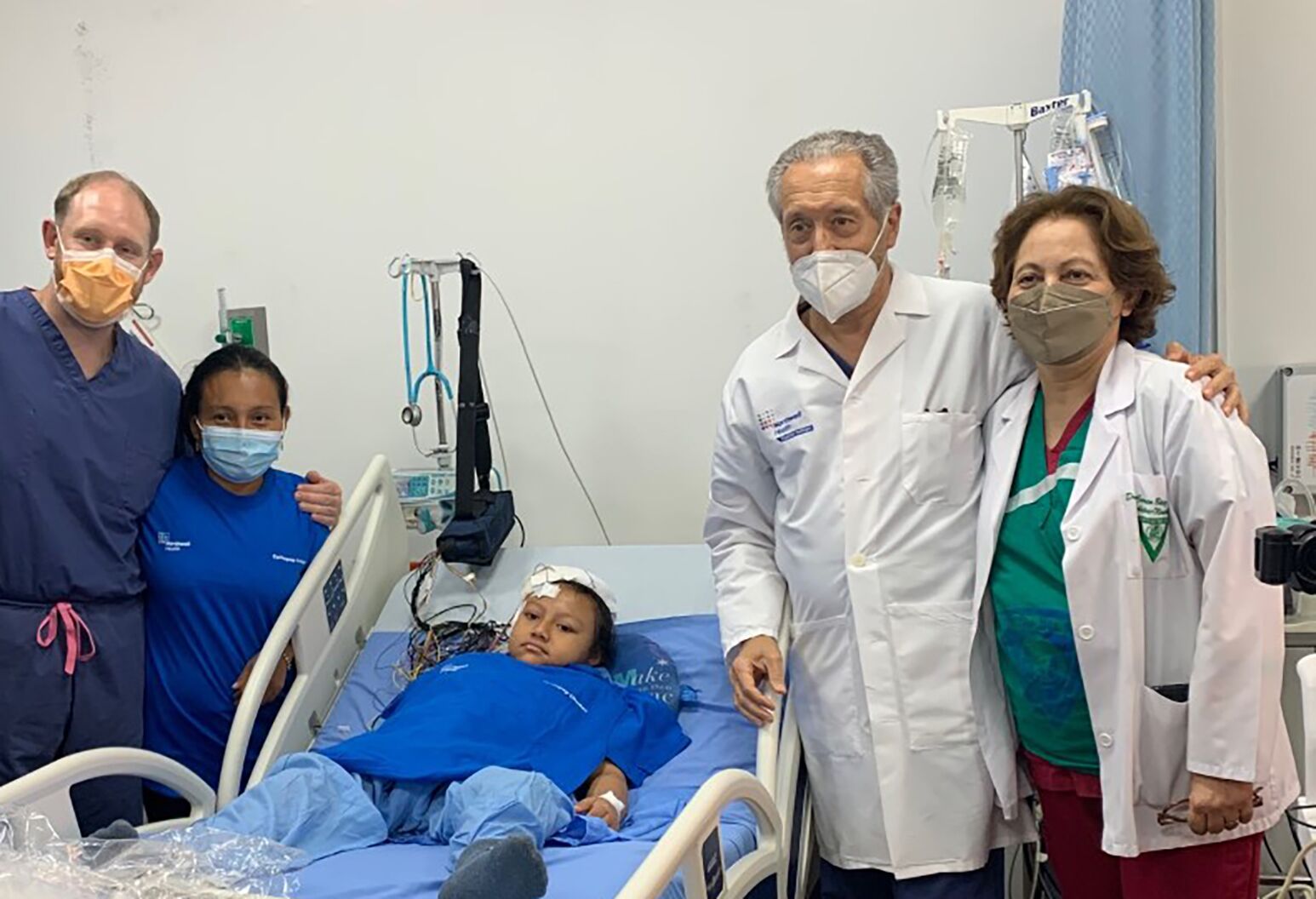Our representatives are available to schedule your appointment Monday through Friday from 9am to 5pm.
For a Northwell ambulance, call
(833) 259-2367.

It started as a project to bring children suffering from uncontrollable epilepsy to the United States from his native home of Panama. Now, 20 years later Ruben Kuzniecky, MD, vice chair of neurology for Northwell Health, has seen it blossom into a sustainable model of epilepsy care for children in Panama.
On their most recent trip in June, Dr. Kuzniecky and his team marked the occasion by reuniting with the patients and families whose lives have been forever changed by their two decades of service. They joined Panama’s first lady, Yazmín Colón de Cortizo to celebrate the milestone.
The team traveled to Panama City Hospital de Ninos de Panama, Children’s Hospital on June 19, 2022 to provide charitable epilepsy surgery care to 13 children in desperate need. They were accompanied by Shaun Rogers, MD and David Bonda, MD, pediatric neurosurgeons at Northwell Health, as well as neurosurgeons Howard Weiner, MD, and Nisha Gadgil, MD from Baylor College of Medicine.
“These families know that this is a unique opportunity, there’s no other way unless US based doctors come to Panama,” Dr. Kuzniecky explained. “Some families come from the middle of nowhere, traveling eight hours from the mountains on horseback to bring their children.”
Dr. Kuzniecky noted one particular case where a two and half-year-old girl suffered from daily seizures — a sudden surge of disruptive electrical activity in the brain that usually affects how a person feels or acts for a brief amount of time.
“We did the surgery and now she’s seizure-free for the first time in her life," he added. "For this family, it’s a little miracle.”
Epilepsy is a neurological disorder diagnosed when a person has recurring seizures due to an overstimulation or disruption of nerve cell activity in the brain. The primary symptom of epilepsy is seizures, which can be caused by brain injury, stroke or may be hereditary. However, in the majority of cases, the cause of epilepsy is unknown.
“There’s a lot of sayings: Every journey starts with a single step. The beginning is the most important part of the work. For us, it was trusting the process,” Dr. Kuzniecky recalled about forming what would become one of the most fruitful parts of his career.
"When we started to bring children to the U.S. the limitations became clear. It became impossible to do this on a larger scale, because of the cost, because these are mostly people without any type of health care coverage, insurance or means. It just wasn’t possible,” he explained.

In the early years Dr. Kuzniecky recalls "patching together" support for hotels and flights. Now more streamlined, that support has continued and, in the years that followed, the surgeon cemented a partnership with the Children’s Hospital of Panama to continue the program. Working with local medical providers in the country, his team helped build a sustainable model not only to support the patients, but the local economy in sourcing equipment and materials.
Dr. Kuzniecky travels to Panama several times a year to identify potential patients and to plan for their surgeries. He brings physicians from the U.S., as well as medical residents and fellows to advance their training. In turn, their team has passed their knowledge and expertise to the local physicians to provide follow-up care for these patients.
“It’s a very unique opportunity for everyone involved,” Dr. Kuzniecky said. “The number of epilepsy surgeries we do in a week, our surgeons don’t do in a month — it’s great experience for them.”
“There’s a lot of planning involved, and it’s a bit of a whirlwind when we arrive, because there’s limited time that we’re there," he said. "The fact that you meet these parents for the first time and then within fifteen minutes the patient is taken into the OR; it’s kind of unusual, but it’s optimized for efficiency and for the families to have this high-level of care close to home.”
Through the continual examination of their process, the team has helped reduce costs for these surgical programs.
“The cost of a surgery like this in the U.S. would be around $200,000 to $300,000,” Dr. Kuzniecky explained. “In Panama, we looked at the costs and it’s probably around $15,000-$25,000. On the flipside, by examining these processes, we can increase access and reduce costs in the U.S. because at the end of the day, we’re under the same pressures.”
Plans for 2023 are already in the works and the foundation for the future of the surgical epilepsy program is set for the next twenty years.
“People will ask, ‘why do we do this work in other countries when there are people in the U.S. in need?’ As physicians, we have our own obligation and passion to help where the help is needed,” Dr. Kuzniecky explained. “But building programs like this is work, and through that work you discover solutions — not just for the microcosm, but for the macro and make sensible changes back in the States to build cultural competency for our medical professionals in New York.”
Northwell's integrated and multidisciplinary team of specialty-trained epilepsy neurologists, neurosurgeons, neuropsychologists, nurses and nurse practitioners, pharmacists, social workers and technical staff all work together to provide patients with personalized care. The standard treatment for epileptic seizures is medication, but if a patient does not respond to medicine, we can perform innovative surgical treatment options to control and prevent seizures. Between 50 and 100 epilepsy surgeries are performed each year, and 90 percent of patients are either seizure-free or have reduced seizures one year after surgery.
Our representatives are available to schedule your appointment Monday through Friday from 9am to 5pm.
For a Northwell ambulance, call
(833) 259-2367.